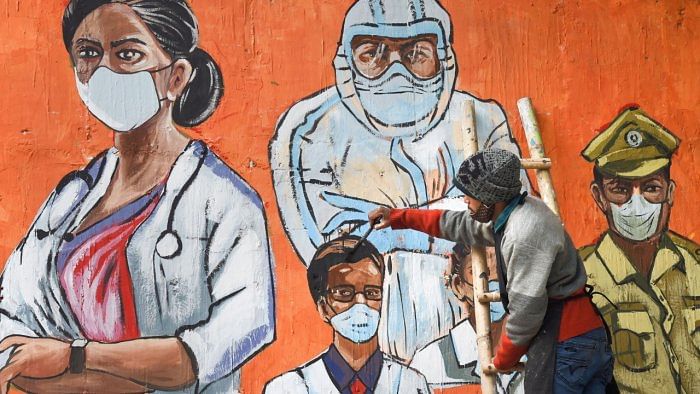
With the daily Covid-19 count showing a decline in Delhi and Mumbai, medical experts on Sunday said they were cautiously optimistic that the two metropolises may have reached the peak of the Omicron-driven third wave as the test positivity rate remained stable for Delhi and nosedived in Mumbai.
However, because of a drop in the number of tests due to a change in the government strategy, they said it would be better to wait for some time for a definite answer on the trend, which they described as “positive” that matched with a Covid-19 model forecast.
Also Read | Covid-19 cases in Mumbai drop below 10,000
Mumbai reported its highest Covid count of 16,420 cases on Jan 12 with a test positivity rate of 24.38% following which there is a steady decline for the next four days leading to a sub-10K figure of 7,895 cases on Sunday. Delhi recorded its highest (28,867) on Jan 13 after which the daily count is on the wane, logging just above 18,000 new cases on Sunday.
“While there is a drop in tests, the TPR is stable, which along with declining positives suggests we are at a peak. The actual decline will come in the coming week,” said Anurag Agarwal, director of the Institute of Genomics and Integrative Biology and one of the key members of the INSACOG (Indian SARS-CoV-2 Genome Consortium).
Others, however, are more circumspect largely due to a corresponding drop in the Covid-19 testing number.
In Delhi, the number of tests dropped from 105,000 plus on Jan 12 and nearly 99,000 on Jan 13 to 65,000 plus on Jan 16. In Mumbai, the decline was more gradual – from 68,249 tests on Jan 9 to around 54,500 tests on Jan 15 and a slight increase to 57,500 on Sunday.
“At the moment, it's hard to say whether the drop in is due to the peak or lower tests. The test positivity is high, so there are certainly people who are simply not being tested in sufficient numbers. People who are choosing not to be tested will skew the underlying numbers,” Gautam Menon, a professor at Ashoka University and the Institute of Mathematical Sciences, Chennai, who is tracking the pandemic, told DH.
“However, we did project that the Omicron wave in the big Indian cities would turn around early, around Jan 20, while it would take more time for the rest of the country, in particular rural India. So these signs are encouraging,” he added.
Menon was part of a team that last week predicted that the third wave would peak between January 20 and February 20 with 600,000-900,000 daily cases for the country. The team comprising researchers from IISc, Bengaluru and Indian Statistical Institute, Kolkata predicted the big cities would be peaking towards the earlier date.
A peak in Delhi and Mumbai, however, doesn’t mean an end of the third wave in India with 265 districts reporting a test positivity above 10% and 149 districts having a positivity between 5-10%.
“Unless we see the numbers from smaller towns and rural areas, we cannot conclude that the peak has been reached in the country as a whole. The wave starts first and recedes first in the big cities,” said K Srinath Reddy, president of Public Health Foundation of India.
Check out DH's latest videos:
